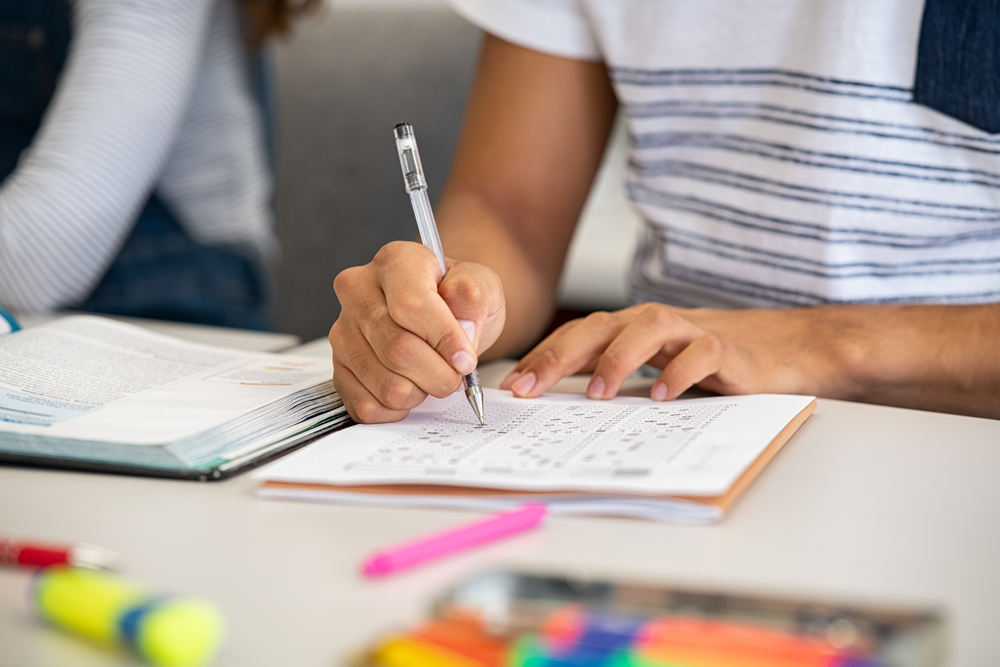Board exams are approaching, and as a 12th-standard student, it is natural for you to feel anxious and stressed.
We can understand the pressure that falls on your shoulders to get into a prestigious college, meet your parent’s and societal expectations, and so on. But don’t let this fear creep into you.
Prepare thoroughly for the upcoming exams and make that your top priority now. While covering textbooks and reference materials is important, practicing previous years’ question papers should be integral to your preparation strategy.
In this blog, we will discuss 5 compelling reasons why solving previous years’ question papers is valuable to succeed in the board exams and provide some tips for making the most of this study technique. Let’s get started!

5 Reasons Why Solving 12th Previous Year Question Papers is Important
Here are the top 5 benefits of solving previous years’ question papers for 12th-standard students.
#1 Practice & Revision
Solving question papers from previous years acts as excellent practice and a revision of important topics.
When you walk through past year’s papers, you can explore what questions have been asked before and focus more on the repeated ones.
It gives you a better idea of the paper pattern, types of questions asked, and difficulty level. This helps you comprehend and tackle question papers more efficiently during the actual examination.
| Pearls of wisdom: Time yourself strictly when solving previous years’ question papers to adapt to the actual exam time constraints. |
A. Understanding Exam Patterns & Important Topics
When you go through previous years’ question papers, you will get an in-depth idea of exam patterns in terms of sections, question types, marking schemes, and difficulty levels.
You can analyse the weightage of topics, the types of questions frequently asked from each chapter, and how marks are allocated in different sections.
Through this, you can identify areas needing more attention during preparation.
| Pearls of wisdom: Note the recurring topics and questions over the past 5 to 10 years of question papers and focus on mastering those. |
B. Understanding the Marking Scheme
When solving past year papers, you should analyse the marking scheme to clarify how marks are allocated to different parts of an answer.
For instance, for an answer, the marks are divided according to the diagram, explanation, relevant formula, or definition.
This is crucial to mastering how to structure your answers to maximise scores.
| Pearls of wisdom: Learn keywords that fetch full marks or demonstrate in-depth understanding in your answers. |
#2 Effective Time Management
When solving previous years’ question papers, you can train yourself to manage your time effectively.
A. Improving Speed and Accuracy
With regular practice, students can improve their speed and accuracy over time. Generally, during exams, students may find reading and comprehending questions fully to be time-consuming.
But by solving previous years’ question papers, students can learn time-management techniques, and their pace naturally increases. They will learn how to answer questions within the allotted time limits. So, practicing past papers boosts board exam performance significantly.
| Pearls of wisdom: Note down the time taken to solve each paper and try to improve your timing by 5 to 105 subsequently. Set sectional time limits based on paper analysis. Learn to prioritise solving easier questions first. |
#3 Boosting Confidence
When you solve several question papers from the past years, you will have the incredible confidence to appear for your final exam. And, as said, going into the exams with confidence in your preparation is half the battle won!
As you start practicing your previous years’ papers correctly, you will start to see tangible proof of how much you have learned and improved. This overcomes your fear and makes you feel reassured of your abilities.
Seeing your progress over time is highly motivating and replaces your doubts with a sense of readiness and belief in yourself.
| Pearls of wisdom: Celebrate small wins in your practice paper scores and stay motivated as you approach your final board exams. |
#4 Self-assessment
Solving previous years’ question papers helps assess how far you have come and explore the room for improvement.
- Tracking overall performance & understanding drawbacks
You can objectively track your strengths and weaknesses by practicing multiple question papers from past years.
Through this, you can find topics or chapters that are consistently more challenging and even spot patterns in the kinds of mistakes you regularly make, like misinterpreting questions or failing to answer fully.
This self-analysis helps in recognising areas that need more focus and practice. It provides feedback to optimise your preparation as per your specific learning needs.
| Pearls of wisdom: Regular self-assessment is important to maximise your learning from past papers. |
#5 Strategic Planning
With a thorough analysis of past years’ papers, you can strategically plan your revision and final preparations.
- Now that you know your weaker areas, you should customise your schedule to focus on those topics.
- Understand which question types eat up more time or where you lose marks for missing key points.
- Fine-tune your time-management skills by practicing writing structured and comprehensive answers within the allocated time.
| Pearls of wisdom: Rank your preparation priorities based on past paper analysis to utilise revision time optimally! |
12th Standard Model Question Papers
Hey 12th-standard aspirants, make use of these model question papers and prepare well for your board exams. Remember, practice is the key to see your marks double!
Tips for solving previous year papers effectively
Here are some tips to keep in mind for making the most of your previous years’ paper practice.
- Set a schedule and stick to it- Commit to solving at least one full past paper per week to keep momentum.
- Vary the years- Mix old papers with recent ones to get a comprehensive view.
- Time yourself accurately- Work under exam conditions to build stamina and pace.
- Mark your papers yourself- Check answers against keys and analyze mistakes.
- Take short breaks in between- Stay fresh while solving long papers.
- Review difficult questions again- Revisit concepts you were unsure of for reinforcement.
- Discuss doubts with teachers- Get expert guidance to clear misunderstandings.
- Track your progress over time- Note improvements to stay motivated.
- Practice under exam pressure- Simulate real exams to prepare mentally.
Why Should You Consider Takshashila University for your College Studies?
Are you looking for an enriching university experience? Choose Takshashila University. Ranked among India’s top private universities, it offers cutting-edge infrastructure and innovative teaching methods to ensure students gain deep knowledge and industry-relevant skills.
With strong industry connections, Takshashila provides internship opportunities for hands-on learning. The faculty is highly supportive and mentors students towards their career goals.
Beyond academics, it fosters holistic growth through a wide range of extracurricular clubs and sports. Takshashila is fully committed to nurturing talented students and preparing them for future success.
Kickstart your journey with one of India’s premier educational institutions now!
Conclusion
Solving the 12th previous year question paper is crucial because it ensures standardised test conditions for self-assessment. Being aware of actual exam patterns and difficulty levels makes you more examination-ready. Follow a disciplined approach and set tangible improvement targets across your practice sessions. Prepare smartly by solving past papers and confidently achieve your best score!
Frequently Asked Questions (FAQs)
1. What are the benefits of solving 12th previous year question papers?
The benefits include practice and revision, improving time management skills, boosting exam confidence, self-assessment, and strategic planning. It helps students understand exam patterns and score better.
2. How many previous year question papers should I solve?
Aim to solve at least one full paper per week to keep your preparation on track. Solve papers from the last 5 years for the most relevant practice.
3. When should I start solving the 12th question papers from the previous year?
It’s best to start solving question papers at least 6 months before your board exams. This gives you enough time to practice multiple papers and identify weak areas for focused preparation.
4. What tips should I follow while solving 12th previous year question papers?
Set a schedule, time yourself accurately, analyse mistakes, take breaks, review difficult topics, discuss doubts with teachers, and track your progress over time for effective practice.
5. How will solving previous year’s question papers help me score better?
It improves subject knowledge, time management, speed, and confidence. You’ll understand exam patterns and marking schemes and focus more on important topics- all of which help maximise scores.





